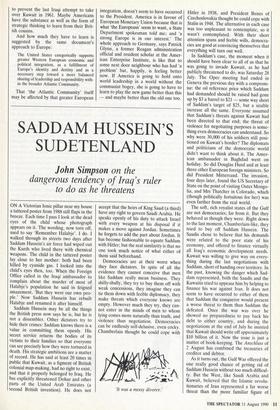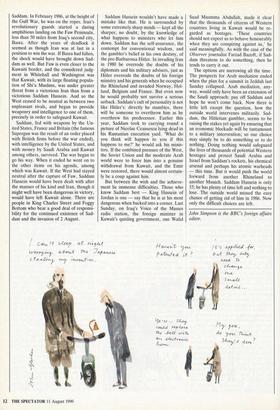SADDAM HUSSEIN'S SUDETENLAND
John Simpson on the
dangerous tendency of Iraq's ruler to do as he threatens
ON A Victorian Ionic pillar near my house a tattered poster from 1988 still flaps in the breeze. Each time I pass I look at the dead eyes of the child whose photograph appears on it. The wording, now torn off, used to say 'Remember Halabje'. I do. I walked through its streets two days after Saddam Hussein's air force had wiped out the Kurds who lived there with chemical weapons. The child in the tattered poster lay close to her mother: both had been killed by cyanide gas. I looked into the child's eyes then, too. When the Foreign Office called in the Iraqi ambassador to complain about the murder of most of Halabje's population he said in feigned amazement, 'But they were our own peo- ple.' Now Saddam Hussein has rebuilt Halabje and renamed it after himself.
Saddam Hussein may be all the things the British press now says he is, but he is not a dissembler. Other dictators try to hide their crimes: Saddam knows there is a value in committing them openly. His secret service returns the bodies of its victims to their families so that everyone can see precisely how they were tortured in death. His strategic ambitions are a matter of record. He has said at least 20 times in public that Kuwait, as a figment of British colonial map-making, had no right to exist, and that it properly belonged to Iraq. He has explicitly threatened Dohar and other parts of the United Arab Emirates (a second British invention). He does not accept that the heirs of King Saud (a third) have any right to govern Saudi Arabia. He speaks openly of his duty to attack Israel with every weapon at his disposal if it makes a move against Jordan. Sometimes he forgets to add the part about Jordan. It has become fashionable to equate Saddam with Hitler; but the real similarity is that no one took much notice of what either of them said beforehand.
Democracies are at their worst when they face dictators. In spite of all the evidence they cannot conceive that men like Saddam really mean business. They shilly-shally, they try to buy them off with weak concessions, they imagine they can tie them down with feeble diplomacy, they make threats which everyone knows are empty. However much they try, they can- not enter in the minds of men to whom lying comes more naturally than truth, and violence than negotiation. Democracies can be endlessly self-delusive, even cocky. Chamberlain thought he could cope with 'It was a messy divorce.' Hitler in 1938, and President Benes of Czechoslovakia thought he could cope with Stalin in 1948. The alternative in each case was too unpleasant to contemplate, so it wasn't contemplated. With their short attention spans and feeble wills, democra- cies are good at convincing themselves that everything will turn out well.
In Saddam's case, the moment when it should have been clear to all of us that he was going to invade Kuwait, as he had publicly threatened to do, was Saturday 28 July. The Opec meeting had ended in Geneva the previous day with a comprom- ise: the oil reference price which Saddam had demanded should be raised had gone up by $3 a barrel to $21 — some way short of Saddam's target of $25, but a sizable increase all the same. Everyone assumed that Saddam's threats against Kuwait had been directed to that end; the threat of violence for negotiating purposes is some- thing even democracies can understand. So why were 30,000 of his soldiers still posi- tioned on Kuwait's border? The diplomats and politicians of the democratic world didn't want to think about it. The Amer- ican ambassador in Baghdad went on holiday. So did Douglas Hurd and at least three other European foreign ministers. So did President Mitterrand. The invasion, four days later, found the US Secretary of State on the point of visiting Outer Mongo- lia, and Mrs Thatcher in Colorado, which (though politically fortuitous for her) was even farther from the real world.
The soft, rich royalist states of the Gulf are not democracies; far from it. But they behaved as though they were. Right down to the last moment, Chamberlain-like, they tried to buy off Saddam Hussein. The Saudis chose to believe that his demands were related to the poor state of his economy, and offered to finance virtually all Iraq's economic development needs. Kuwait was willing to give way on every- thing during the last negotiations with Saddam, short of handing over territory. In the past, knowing the danger which Sad- dam represented, both the Saudis and the Kuwaitis tried to appease him by helping to finance his war against Iran. It does not seem to have occurred to either of them that Saddam the conqueror would present a worse threat to them than Saddam the defeated. Once the war was over he showed no preparedness to pay back his debt to either country, and during the negotiations at the end of July he insisted that Kuwait should write off approximately $10 billion of it. Now the issue is just a matter of book-keeping. The Anschluss of 2 August has combined the treasuries of creditor and debtor.
As it turns out, the Gulf War offered the one really good chance of getting rid of Saddam Hussein without too much difficul- ty. But the West, like Saudi Arabia and Kuwait, believed that the Islamic revolu- tionaries of Iran represented a far worse threat than the more familiar figure of Saddam. In February 1986, at the height of the Gulf War, he was on the ropes. Iran's revolutionary guards started a daring amphibious landing on the Faw Peninsula, less than 50 miles from Iraq's second city, Basra. After the years of deadlock it seemed as though Iran was at last in a position to win the war. If Basra had fallen, the shock would have brought down Sad- dam as well. But Faw is even closer to the Kuwaiti border, and the considered judg- ment in Whitehall and Washington was that Kuwait, with its large floating popula- tion of Shi'a Muslims, was under greater threat from a victorious Iran than from a victorious Saddam Hussein. And so the West ceased to be neutral as between two unpleasant rivals, and began to provide weaponry and intelligence to one of them, precisely in order to safeguard Kuwait.
Saddam, fed with weapons by the Un- ited.States, France and Britain (the famous Supergun was the result of an order placed with British firms before the war ended), with intelligence by the United States, and with money by Saudi Arabia and Kuwait among others, survived. The war began to go his way. When it ended he went on to the other items on his agenda, among which was Kuwait. If the West had stayed neutral after the capture of Faw, Saddam Hussein would have been dealt with after the manner of his kind and Iran, though it might well have been dangerous in victory, would have left Kuwait alone. There are people in King Charles Street and Foggy Bottom who bear a good deal of responsi- bility for the continued existence of Sad- dam and the invasion of 2 August. Saddam Hussein wouldn't have made a mistake like that. He is surrounded by some extremely sharp minds — kept all the sharper, no doubt, by the knowledge of what happens to ministers who let him down. Saddam has the self-assurance, the contempt for conventional wisdom, and the gambler's belief in his own destiny, of the pre-Barbarossa Hitler. In invading Iran in 1980 he overrode the doubts of his diplomats and his military advisers, just as Hitler overrode the doubts of his foreign ministry and his generals when he occupied the Rhineland and invaded Norway, Hol- land, Belgium and France. But even now he would probably not survive a serious setback. Saddam's cult of personality is not like Hitler's: directly he stumbles, there will be someone to overthrow him as he overthrew his predecessor. Earlier this year, Saddam took to carrying round a picture of Nicolae Ceausescu lying dead in his Rumanian execution yard. 'What do you think will happen to you if this happens to me?' he would ask his minis- ters. If the combined pressure of the West, the Soviet Union and the moderate Arab world were to force him into a genuine withdrawal from Kuwait, and the Emir were restored, there would almost certain- ly be a coup against him.
But between the wish and the achieve- ment lie immense difficulties. Those who know Saddam best — King Hussein of Jordan is one — say that he is at his most dangerous when backed into a corner. Last Sunday, on Iraq's Voice of the Masses radio station, the foreign minister in Kuwait's quisling government, one Walid Suad Muamma Abdullah, made it clear that the thousands of citizens of Western countries living in Kuwait would be re- garded as hostages. 'These countries should not expect us to behave honourably when they are conspiring against us,' he said meaningfully. As with the case of the Observer journalist Farzad Bazoft, if Sad- dam threatens to do something, then he tends to carry it out.
The options are narrowing all the time. The prospects for Arab mediation ended when the plan fox a summit in Jeddah last Sunday collapsed. Arab mediation, any- way, would only have been an extension of the Saudi approach: pay off Saddam and hope he won't come back. Now there is little left except the question, how the outside world intervenes militarily. Sad- dam, the Hitlerian gambler, seems to be raising the stakes yet again by ensuring that an economic blockade will be tantamount to a military intervention; so our choice may simply be to do something or to do nothing. Doing nothing would safeguard the lives of thousands of potential Western hostages and protect Saudi Arabia and Israel from Saddam's rockets, his chemical arsenal and perhaps his atomic warheads — this time. But it would push the world forward from another Rhineland to another Munich. Saddam Hussein is only 53; he has plenty of time left and nothing to lose. The outside world missed the easy chance of getting rid of him in 1986. Now only the difficult choices are left.
John Simpson is the BBC's foreign affairs editor.











































 Previous page
Previous page